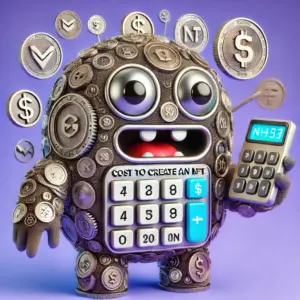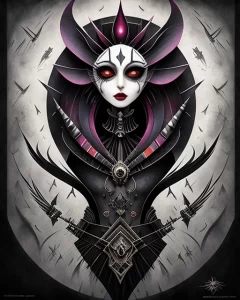The NFT (Non-Fungible Token) revolution has stormed the digital landscape, transforming the way we interact with and own digital assets. This exciting new frontier has birthed a thriving marketplace for unique collectibles, artwork, and experiences. If you’re brimming with ideas and possess an entrepreneurial spirit, venturing into the realm of NFT marketplace creation might be the perfect odyssey for you.
This guide delves into the intricate process of building your very own NFT marketplace, equipping you with the knowledge and resources necessary to navigate this ever-evolving space. From conceptualizing your niche to ensuring robust security, we’ll explore each step in meticulous detail.
Unearthing Your Niche: Carving a Space in the NFT Galaxy
The NFT marketplace is a vibrant ecosystem brimming with diverse offerings. Before embarking on your development journey, it’s crucial to identify a niche that aligns with your vision and caters to a specific audience. Here are some key considerations:
- Passion Projects: Are you a fervent supporter of a particular art style, music genre, or gaming platform? Building a marketplace catering to this niche allows you to leverage your existing knowledge and connect with a passionate community.
- Identifying Market Gaps: Conduct thorough market research to pinpoint any unmet needs within the NFT landscape. Is there a lack of platforms dedicated to specific asset types, like educational NFTs or virtual land parcels within the metaverse? Filling these gaps can establish your marketplace as a frontrunner.
- Community Focus: NFTs have fostered a powerful sense of community ownership. Consider centering your marketplace around a specific creator community, fostering collaboration and loyalty among users.
Choosing Your Weapon: Selecting the Right Blockchain for Your NFT Marketplace
The heart of any NFT marketplace lies in the blockchain technology it utilizes. Here are some prominent blockchain platforms to consider:
- Ethereum (ETH): The undisputed pioneer of the NFT space, Ethereum boasts a robust developer ecosystem and established user base. However, transaction fees can be substantial.
- Solana (SOL): Renowned for its lightning-fast transaction speeds and low fees, Solana is a compelling alternative. However, its developer ecosystem is still under development compared to Ethereum.
- Polygon (MATIC): A sidechain scaling solution for Ethereum, Polygon offers a cost-effective and scalable platform for NFT marketplaces.
- Binance Smart Chain (BNB): Developed by cryptocurrency exchange giant Binance, BSC provides a user-friendly and high-throughput environment for NFT transactions.
The choice of blockchain hinges on factors like scalability, transaction fees, security, and the technical expertise of your development team.
The Backbone of Trust: Crafting Secure Smart Contracts
Smart contracts are the self-executing code snippets that govern transactions on a blockchain network. They play a pivotal role in your NFT marketplace, handling functionalities like:
- NFT Minting and Ownership Management: Smart contracts facilitate the creation and transfer of ownership for NFTs on your marketplace.
- Escrow Services: They ensure secure transactions by holding funds until the NFT ownership is successfully transferred.
- Royalty Distribution: Smart contracts enable automated royalty payments to creators whenever their NFTs are resold on the marketplace.
Developing secure and well-tested smart contracts is paramount. Consider collaborating with experienced blockchain developers well-versed in the specific nuances of your chosen platform.
Building Your Digital Emporium: User Interface and User Experience (UI/UX) Design
A seamless and intuitive user interface (UI) is critical for attracting and retaining users on your NFT marketplace. Here are some UI/UX design principles to keep in mind:
- Simplicity and Clarity: Strive for a clean and easily navigable interface. Users should be able to effortlessly browse NFTs, view details, and initiate transactions.
- Compelling Visual Presentation: Showcase NFTs in all their glory with high-quality visuals and intuitive navigation options.
- Advanced Search and Filtering: Integrate robust search and filtering tools, allowing users to find NFTs based on specific criteria.
- Integrated Wallets: Ensure a seamless user experience by enabling users to connect popular cryptocurrency wallets directly to your marketplace.
Invest in crafting a user-friendly UI/UX that caters to both seasoned NFT enthusiasts and newcomers to the space.
Integrating Essential Functionality: Features for a Robust Marketplace
Beyond core functionalities like NFT listing and trading, additional features can elevate your marketplace’s appeal:
- Auction System: Implement an auction system to enable users to bid on NFTs, fostering a sense of excitement and competition.
- Multi-Currency Support: Cater to a wider audience by accepting payments in various cryptocurrencies and potentially even fiat currencies.
- Social Features: Integrate social features like user profiles, comments, and messaging to foster a sense of community within your marketplace.
- Content Delivery Networks (CDNs): Utilize CDNs to ensure efficient and secure delivery of NFT data and media files.
Securing Your Fortress: Prioritizing Security in Your NFT Marketplace
The security of your NFT marketplace is paramount. Here’s a breakdown of crucial security measures to implement:
- Smart Contract Audits: Before deploying your smart contracts, engage a reputable blockchain security firm to conduct thorough audits and identify any potential vulnerabilities.
- Secure Login and Authentication: Utilize robust login protocols like two-factor authentication (2FA) to safeguard user accounts and prevent unauthorized access.
- Data Encryption: Implement industry-standard encryption practices to protect sensitive user data and NFT assets.
- Bug Bounty Programs: Consider establishing bug bounty programs that incentivize security researchers to uncover and report vulnerabilities in your platform.
By prioritizing security, you build trust with your users and minimize the risk of cyberattacks that could cripple your marketplace.
Marketing and Community Building: Attracting Users to Your NFT Galaxy
Building a thriving NFT marketplace requires a well-defined marketing strategy. Here are some effective approaches:
- Community Engagement: Actively engage with potential users on social media platforms like Discord and Twitter. Participate in relevant online discussions and build a strong brand identity.
- Influencer Marketing: Collaborate with relevant NFT influencers to promote your marketplace to their established audience.
- Content Marketing: Create informative content that educates users about NFTs, your marketplace’s unique features, and the benefits of using it.
- Strategic Partnerships: Forge strategic partnerships with NFT creators, artists, and other marketplaces to cross-promote each other’s offerings and expand your user base.
Remember, building a loyal community takes time and consistent effort. Foster a positive and inclusive environment that attracts and retains users in the long run.
The Legal Landscape: Navigating Regulatory Compliance
The regulatory landscape surrounding NFTs is still evolving. However, it’s crucial to stay informed about relevant regulations and ensure your marketplace operates within legal boundaries. Here are some recommendations:
- Seek Legal Counsel: Consult with an attorney specializing in blockchain technology and cryptocurrency to understand the legal implications of operating an NFT marketplace.
- Know Your Customer (KYC): Implement KYC procedures to verify user identities and prevent illegal activities like money laundering.
- Terms of Service: Draft clear and comprehensive terms of service outlining user rights and responsibilities, as well as the limitations of your platform.
By adhering to legal requirements, you demonstrate transparency and build trust with your users and regulatory bodies.
The Final Frontier: Ongoing Maintenance and Development
The NFT marketplace landscape is constantly evolving. Here’s how to ensure your platform remains competitive in the long run:
- Proactive Updates and Bug Fixes: Regularly update your platform with new features, address bugs promptly, and maintain compatibility with the latest blockchain protocols.
- Community Feedback: Actively solicit feedback from your users and incorporate their suggestions into future development plans. This ensures your marketplace caters to the evolving needs of your audience.
- Innovation and Expansion: Continuously explore innovative features and functionalities to differentiate your marketplace and stay ahead of the curve. This might involve integrating new asset types, supporting emerging blockchain technologies, or exploring the possibilities of the metaverse.
Building an NFT marketplace requires dedication, technical expertise, and a keen eye for the future. By following this comprehensive guide and continuously adapting to the dynamic NFT landscape, you can forge a successful path in this exciting new frontier.
Additional Considerations for Aspiring NFT Marketplace Builders
Cost Considerations: Building an NFT marketplace involves various costs, including:
- Blockchain Development Fees: The complexity of your smart contracts and chosen blockchain platform will significantly impact development costs.
- Security Audits: Thorough security audits conducted by reputable firms are essential but can be expensive.
- Front-End and Back-End Development: The cost of building a user-friendly UI and robust back-end infrastructure depends on the chosen development team’s expertise and location.
- Marketing and Community Building: Budget for marketing campaigns, influencer partnerships, and community management initiatives to attract users.
Carefully plan your budget and explore cost-saving measures like utilizing open-source blockchain frameworks or outsourcing specific development tasks.
Team Building: Assembling a competent team is crucial for the success of your NFT marketplace. Here are some key team members to consider:
- Blockchain Developers: These individuals will develop and audit your smart contracts, ensuring secure and efficient functionality on your chosen blockchain network.
- Front-End and Back-End Developers: They will build the user interface, user experience, and underlying infrastructure that powers your marketplace.
- Security Experts: They will conduct rigorous security audits and advise on best practices to safeguard your platform from cyberattacks.
- Marketing and Community Managers: These individuals will spearhead marketing campaigns, manage social media presence, and foster a thriving community around your marketplace.
Consider building an in-house team or outsourcing specific tasks to experienced freelancers or agencies specializing in blockchain development.
Monetization Strategies: There are several ways to generate revenue from your NFT marketplace:
- Transaction Fees: Charge a percentage fee on each NFT sale conducted on your platform.
- Listing Fees: Implement optional listing fees for users who want to showcase their NFTs on your marketplace.
- Subscription Model: Offer premium subscriptions with benefits like priority listing placements, discounted fees, or exclusive content.
- Royalty Fees: Allow creators to set up royalty structures that automatically grant them a percentage of the sale price whenever their NFTs are resold on your platform.
Choose a monetization strategy that aligns with your overall business goals and user experience.
Staying Ahead of the Curve: The NFT space is constantly evolving. Here are some ways to remain informed and adapt your marketplace accordingly:
- Follow Industry Leaders: Keep tabs on prominent NFT marketplaces, emerging trends, and innovations within the blockchain and metaverse landscape.
- Engage with the Community: Actively participate in online forums, conferences, and discussions related to NFTs. This helps you stay attuned to user needs and emerging trends.
- Embrace Innovation: Be open to exploring new technologies, integrating new asset types (like virtual land parcels in the metaverse), and adapting your platform to cater to the evolving needs of your user base.
By staying informed and embracing a future-oriented perspective, you can ensure your NFT marketplace remains relevant and thrives in the ever-evolving digital landscape.
Building an NFT marketplace is a complex yet rewarding endeavor. With a well-defined plan, a skilled team, and a commitment to continuous improvement, you can carve your niche within the NFT ecosystem and contribute to the future of digital ownership.






